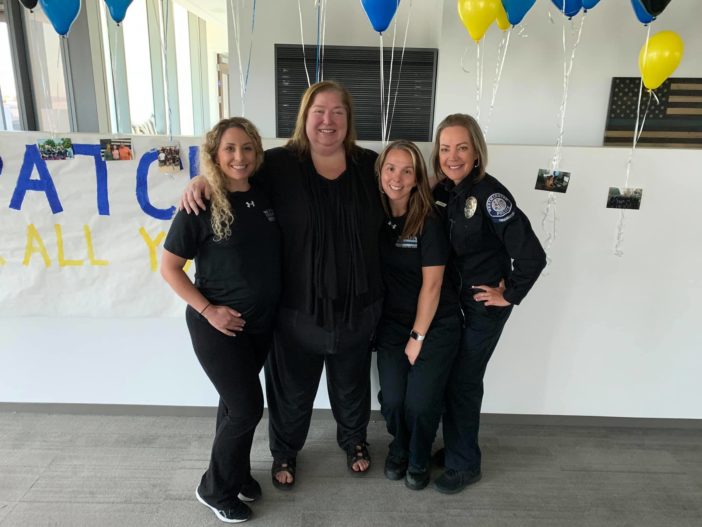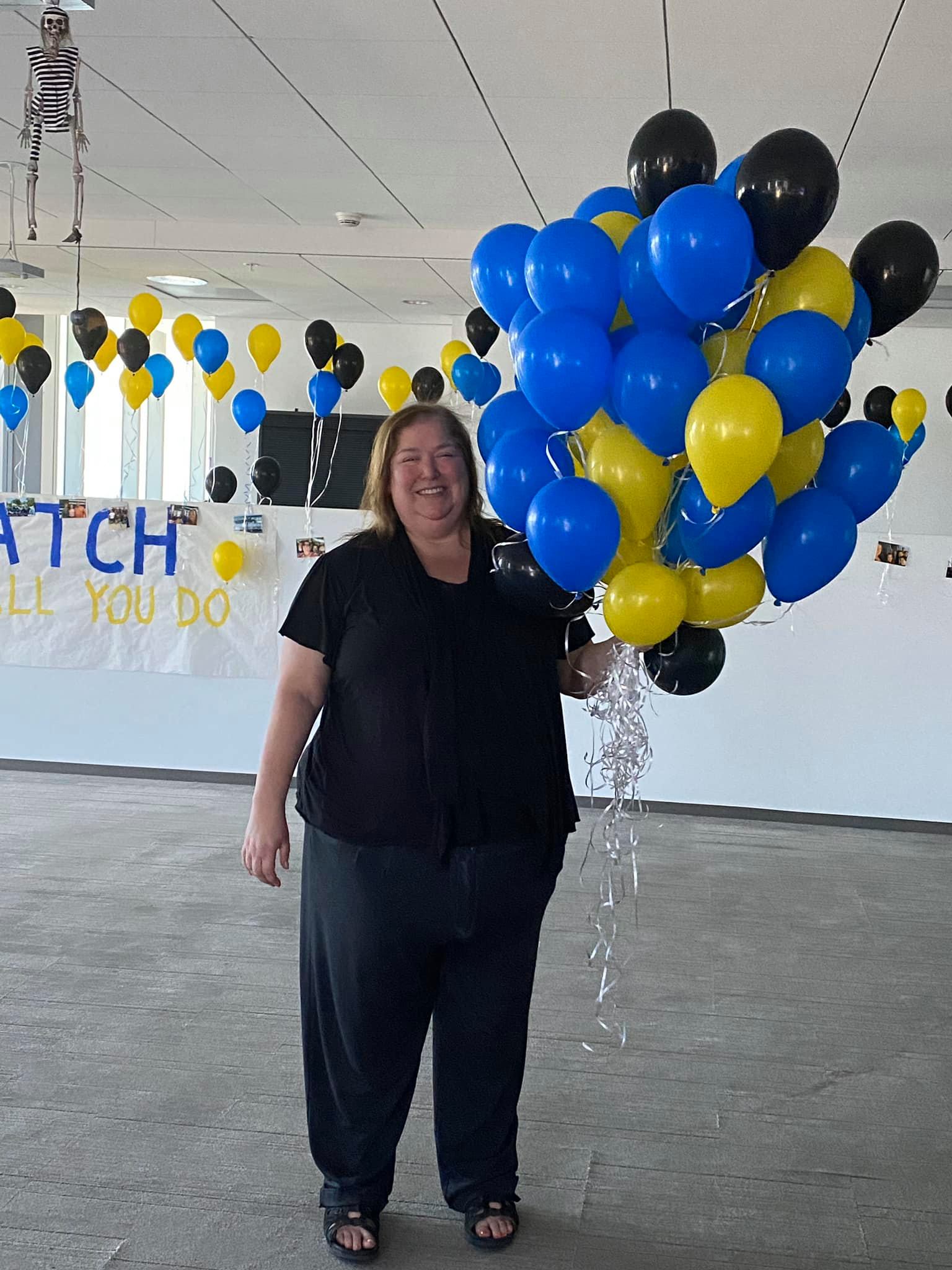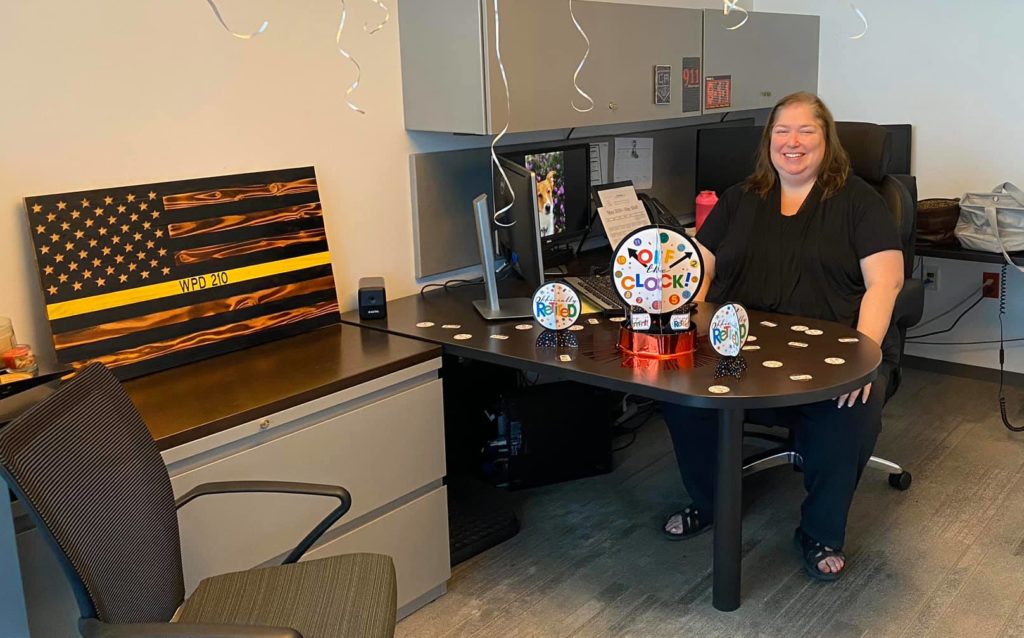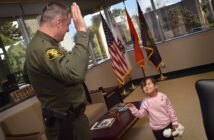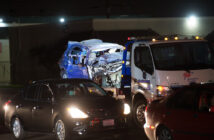It was late one night when the calls started coming in for a cow running loose on the streets of Westminster.
The cow ran down streets with officers chasing it for more than an hour. At one point the cow even jumped over the hood of a police unit, damaging the vehicle.
It was hectic — and funny, said Westminster Police Department Communications Supervisor Sonia Kelly.
“Hearing the officers’ transmissions of them trying to corral an animal there’s no way they were ever going to catch was hilarious,” she said. “Finally we were able to track down the owner, who came and contained his cow. Definitely not the type of call we receive in Westminster.”
Over her nearly 29 years at the Westminster Police Department working in dispatch, Kelly has amassed plenty of stories — some funny, some strange, some tragic.
“When our officers were killed in the line of duty … I was working when Officer Phillips was hit by a car and killed. That was heartbreaking,” Kelly said.
But despite the tragedies, she has loved her career. And on July 31 — her retirement date — she will officially say goodbye to the station that has been her home away from home over the past decades.
What will she miss the most?
“The people,” she said. “We have some amazing people that work for the police department, some of the best human beings I’ve ever met have been the people I work with. The camaraderie. It’s a very serious job and a very dangerous job for the officers. It’s just a strong sense of family with that — when something happens with an officer, everybody feels it.”
Kelly was 21 when she started working as a dispatcher for the Westminster Police Department. She hadn’t planned specifically on this career — it sort of just happened. She was working at Sears at the time and her co-worker’s daughter was a dispatcher.
“‘That sounds very interesting,’” she remembered thinking. “Something different every day. It’s definitely not your typical office job and I always found law enforcement intriguing.”
And it has been all that and more.
“I can’t really remember what I expected in the beginning anymore,” she said. But she found it to be “definitely a crazy-busy job — sometimes rewarding, frustrating. We definitely like it when we get the suspects in custody. That’s always a good feeling. No. 1 priority is officers go home safe.”
Another thing she’ll miss is the adrenaline rush. Kelly was working when the water tank ruptured in Westminster in 1998. It was early in the morning and in a time before the Internet. Kelly and another dispatcher were — strangely enough — watching “Titanic.”
“I kid you not, it was the very end part when everybody was sinking and drowning,” she said.
And then all of the sudden, the lines lit up.
“The phones were going crazy,” she said
At one point the two dispatchers looked at each other and said, “Oh my God, this is so much fun.”
What dispatchers put their minds through when performing their tasks is like few other jobs. It’s multitasking on steroids.
“Quick-thinking, memory-retention, we have to memorize hundreds of codes, commands on the computer,” she said. “Talking, hearing, typing at the same time, formulating your next question. … The multitasking people do is not normal.”
And dispatchers don’t just listen to what callers are saying, they listen to anything else that may help the officers arriving on the scene. On a recent call, Kelly noticed the woman on the line was coughing repeatedly. Considering the pandemic, she asked her if she was sick — to which she responded “no.” But for safety’s sake, Kelly alerted the responding officer.
“You got to put all the pieces together,” she said. “Pick up on cues on the phone calls, on the radio … hearing background noises … just trying to pinpoint what that could really be.”
She’s worked through riots, homicides, murder-suicides, shootings, stabbings, pursuits and every other kind of emergency call. She recalled a “dragging death” — when a woman was dragged by a car — that started out as a drug deal gone bad. She was also working when one of their sergeants was shot in the line of duty.
“That’s the worst part of the job,” she said. “He survived, thank God.”
She’s seen a lot of changes over the years — including the transition into the world of cell phones, which made a huge impact on dispatchers.
“You go from people [having]only phones in their houses and their businesses to everyone having cell phones — that really changes the complexion of the calls you get,” Kelly said. “You get a lot more callers and you get a lot more callers that don’t know where they’re at. It’s easier if they’re in their house … some people are geographically challenged.”
And while dispatch tracking technology is improving for cell phones, dispatchers can’t yet achieve the same level of accuracy locating a caller who is on a cell phone as if they were on a landline.
“About 83 percent of 911 calls are on cell phones now,” she said. “A lot of people, even myself included, got rid of the home phone.”
She said that a common misconception people have about calling 911 is that while dispatchers are asking their series of questions they’re delaying the officer.
“And that’s not correct,” she said. “We can have someone en route within 30 seconds of you dialing 911.”
Though Kelly’s main job was in dispatch, she also had other duties, including social media manager.
“That was fun being able to share things about our department and our employees with the public,” Kelly said.
On the more serious side, she was also part of the WPD’s Trauma Support Team, which is a peer support group available to employees going through any emotional challenge.
“Due to our officer suicides and line-of-duty deaths — and how much it affected me — I joined our Trauma Support Team and was a supervisor on the team,” she said.
In addition to reaching out to employees going through a difficult time either on or off duty, they also offer psychological debriefings for employees who go through traumatic incidents.
“Being able to help our employees made anything I went through before that worth it because I was able to help others through my experiences,” she said. “The cumulative effects of trauma is a very real challenge for those who work in public safety.”
The WPD has served as an integral part of Kelly’s life throughout the years. In fact, she even found her dog, 5 1/2-year-old Phoebe, when a community member found a stray and an officer picked her up to take to the local animal shelter.
“I was able to adopt her,” Kelly said. “We say she had rescued us. Our other dog had passed away a couple months before that.”
Now heading into retirement and her final 10-7 (radio code for “out of service”), she’ll be spending a lot more time with Phoebe — and her husband, who is already retired. But she’ll miss her team.
“Our dispatchers are phenomenal,” she said. “And I couldn’t have accomplished anything I accomplished without them and the hard work that they do. They do such an amazing job when it hits the fan. So I couldn’t be more proud of them.”
 Behind the Badge
Behind the Badge
